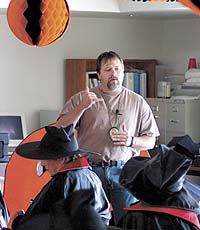Active Re-Entry, The United Way and law enforcement join forces to bring scams aimed at the elderly to light
| Price City Police Officer Shane Henrie gives local seniors advice on how to handle potential scam artists. |
Do not let them into your home, said Price Police Officer Shane Henrie, as he addressed elderly Castle Valley residents at Active Re-Entry.
Henrie spoke to a room full of local seniors, dressed as witches for the Halloween occasion and funded by the United Way, about con artists who are becoming more prevalent within Utah and who are focusing their attention on the elderly.
The Price police officer focused on door-to- door, telephone and Internet scams.
“If you get a phone call you are not interested, you have to interrupt these people and it’s not an easy thing to do,” said Henrie. “They are trained to keep you on the phone and it goes against our nature to be rude to someone we don’t know. But the bottom line is you have to interrupt them and get off the phone.”
According to Henrie, the most important thing when dealing with a potential con artist is to never give out your bank account information, no matter what the situation.
“If someone calls posing to be your bank and they want any account information, hang up and call your bank, never give out your information,” said Henrie.
| All in attendance at the informational seminar dressed as witches to add a festive twist to the serious subject. |
The Price City officer also focused on check scams which involve a check being sent to a local resident claiming they have won a sweepstakes. The letter with the check asks them to deposit a $10,000 check and then send back $4,000 for fees. The only catch is the check is phony and the person who deposited the check is liable for both the $10,000 deposit and the $4,000 withdrawal.
“Many of these scams from the Internet and through the phone are originating in Nigeria,” commented Henrie. “The difficult thing about this is it is difficult for any agency within the United States to prosecute these individuals. When no-call lists first came into law the telemarketers were abiding by them but as time has gone by they have learned that it is very difficult to prosecute them for not taking you off their lists and they will simply continue to call you.”
Henrie reported that a new scam originating out of Mexico has the con artist calling a local individual who is attempting to sell something in the classifieds. They tell the individual that they can only pay with a $10,000 cashiers check and ask if you will deduct the price of your product and send them the rest. The remainder of the scam works out like the sweepstakes scam. The check is phony and once again the local resident ends up holding the bag for the whole sum.
Something else the officer wished to share with the elderly is the prevalence of the drug problem in our area. He reported that many of the forgery cases prosecuted locally occur when a family member steals the account information of a loved one and sells it to obtain narcotics. He recommended that all local residents be mindful of both their account information and their checkbook.
Henrie warned all in attendance that while the Internet is a powerful tool to be used for communication and shopping it must be monitored.
“Something important to remember is that the Internet is like a sharp knife,” concluded Henrie. “It is a useful tool but it can cut you if you are not careful.”

